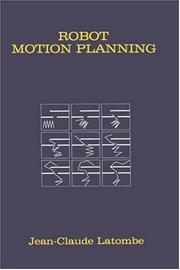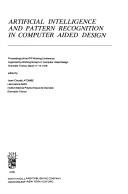| Listing 1 - 10 of 10 |
Sort by
|

ISBN: 0792391292 079239206X 1461540224 9780792392064 9780792391296 Year: 1991 Volume: 124 Publisher: Boston, Mass. Kluwer
Abstract | Keywords | Export | Availability | Bookmark
 Loading...
Loading...Choose an application
- Reference Manager
- EndNote
- RefWorks (Direct export to RefWorks)
Robots --- Motion --- Robotics: manipulators propelling mechanisms sensors (Artificial intelli- gence) --- 681.3*I29 Robotics: manipulators propelling mechanisms sensors (Artificial intelli- gence) --- -Motion --- 681.3*I29 --- 681.3*I29 Robotics: manipulators; propelling mechanisms; sensors (Artificial intelli- gence) --- Robotics: manipulators; propelling mechanisms; sensors (Artificial intelli- gence) --- Movement of robots --- Robot motion --- Computer science --- Artificial intelligence. Robotics. Simulation. Graphics --- Motion. --- Robotique --- Robots - - Motion --- Robots - Motion --- Automatique --- Trajectoire (guidage)
Book
Year: 1978 Publisher: Amsterdam, New York, Oxford "North-Holland"
Abstract | Keywords | Export | Availability | Bookmark
 Loading...
Loading...Choose an application
- Reference Manager
- EndNote
- RefWorks (Direct export to RefWorks)
Book
Year: 1972 Publisher: Grenoble
Abstract | Keywords | Export | Availability | Bookmark
 Loading...
Loading...Choose an application
- Reference Manager
- EndNote
- RefWorks (Direct export to RefWorks)
Book
Year: 1982 Publisher: Paris : IMAG,
Abstract | Keywords | Export | Availability | Bookmark
 Loading...
Loading...Choose an application
- Reference Manager
- EndNote
- RefWorks (Direct export to RefWorks)
MANIPULATEUR --- ROBOTIQUE --- ROBOT
Book
Year: 1989 Publisher: Stanford (Calif.): Stanford University. Department of computer science
Abstract | Keywords | Export | Availability | Bookmark
 Loading...
Loading...Choose an application
- Reference Manager
- EndNote
- RefWorks (Direct export to RefWorks)
Book
Year: 1989 Publisher: Stanford (Calif.): Stanford University. Department of computer science
Abstract | Keywords | Export | Availability | Bookmark
 Loading...
Loading...Choose an application
- Reference Manager
- EndNote
- RefWorks (Direct export to RefWorks)

ISBN: 0444852298 Year: 1978 Publisher: Amsterdam : Elsevier North-Holland,
Abstract | Keywords | Export | Availability | Bookmark
 Loading...
Loading...Choose an application
- Reference Manager
- EndNote
- RefWorks (Direct export to RefWorks)
Artificial intelligence --- -Engineering design --- -Pattern recognition systems --- -681.3*A0 --- 681.3*I2 --- 681.3*I5 --- Pattern classification systems --- Pattern recognition computers --- Pattern perception --- Computer vision --- Design, Engineering --- Engineering --- Industrial design --- Strains and stresses --- AI (Artificial intelligence) --- Artificial thinking --- Electronic brains --- Intellectronics --- Intelligence, Artificial --- Intelligent machines --- Machine intelligence --- Thinking, Artificial --- Bionics --- Cognitive science --- Digital computer simulation --- Electronic data processing --- Logic machines --- Machine theory --- Self-organizing systems --- Simulation methods --- Fifth generation computers --- Neural computers --- Congresses --- Data processing --- -Congresses --- Mathematical models --- General --- Artificial intelligence. AI --- Pattern recognition (Computing methodologies) --- Design --- Engineering design --- Pattern recognition systems --- Congresses. --- 681.3*I5 Pattern recognition (Computing methodologies) --- 681.3*I2 Artificial intelligence. AI --- 681.3*A0 General --- 681.3*A0 --- Data processing&delete& --- Mathematical models&delete& --- BASIC (Computer program language) --- Infographie
Book
ISBN: 3642174515 3642174523 Year: 2010 Publisher: Berlin ; Heidelberg : Springer,
Abstract | Keywords | Export | Availability | Bookmark
 Loading...
Loading...Choose an application
- Reference Manager
- EndNote
- RefWorks (Direct export to RefWorks)
Robotics is at the cusp of dramatic transformation. Increasingly complex robots with unprecedented autonomy are finding new applications, from medical surgery, to construction, to home services. Against this background, the algorithmic foundations of robotics are becoming more crucial than ever, in order to build robots that are fast, safe, reliable, and adaptive. Algorithms enable robots to perceive, plan, control, and learn. The design and analysis of robot algorithms raise new fundamental questions that span computer science, electrical engineering, mechanical engineering, and mathematics. These algorithms are also finding applications beyond robotics, for example, in modeling molecular motion and creating digital characters for video games and architectural simulation. The Workshop on Algorithmic Foundations of Robotics (WAFR) is a highly selective meeting of leading researchers in the field of robot algorithms. Since its creation in 1994, it has published some of the field’s most important and lasting contributions. This book contains the proceedings of the 9th WAFR, held on December 13-15, 2010 at the National University of Singapore. The 24 papers included in this book span a wide variety of topics from new theoretical insights to novel applications.
Mechanical Engineering --- Mechanical Engineering - General --- Engineering & Applied Sciences --- Robotics --- Algorithms --- Engineering. --- Artificial intelligence. --- Robotics. --- Automation. --- Robotics and Automation. --- Artificial Intelligence (incl. Robotics). --- Automatic factories --- Automatic production --- Computer control --- Engineering cybernetics --- Factories --- Industrial engineering --- Mechanization --- Assembly-line methods --- Automatic control --- Automatic machinery --- CAD/CAM systems --- Automation --- Machine theory --- AI (Artificial intelligence) --- Artificial thinking --- Electronic brains --- Intellectronics --- Intelligence, Artificial --- Intelligent machines --- Machine intelligence --- Thinking, Artificial --- Bionics --- Cognitive science --- Digital computer simulation --- Electronic data processing --- Logic machines --- Self-organizing systems --- Simulation methods --- Fifth generation computers --- Neural computers --- Construction --- Industrial arts --- Technology --- Artificial Intelligence.
Digital
ISBN: 9783642174520 Year: 2011 Publisher: Berlin, Heidelberg Springer Berlin Heidelberg
Abstract | Keywords | Export | Availability | Bookmark
 Loading...
Loading...Choose an application
- Reference Manager
- EndNote
- RefWorks (Direct export to RefWorks)
Book
ISBN: 9783642174520 Year: 2011 Publisher: Berlin Heidelberg Springer Berlin Heidelberg
Abstract | Keywords | Export | Availability | Bookmark
 Loading...
Loading...Choose an application
- Reference Manager
- EndNote
- RefWorks (Direct export to RefWorks)
Robotics is at the cusp of dramatic transformation. Increasingly complex robots with unprecedented autonomy are finding new applications, from medical surgery, to construction, to home services. Against this background, the algorithmic foundations of robotics are becoming more crucial than ever, in order to build robots that are fast, safe, reliable, and adaptive. Algorithms enable robots to perceive, plan, control, and learn. The design and analysis of robot algorithms raise new fundamental questions that span computer science, electrical engineering, mechanical engineering, and mathematics. These algorithms are also finding applications beyond robotics, for example, in modeling molecular motion and creating digital characters for video games and architectural simulation. The Workshop on Algorithmic Foundations of Robotics (WAFR) is a highly selective meeting of leading researchers in the field of robot algorithms. Since its creation in 1994, it has published some of the field's most important and lasting contributions. This book contains the proceedings of the 9th WAFR, held on December 13-15, 2010 at the National University of Singapore. The 24 papers included in this book span a wide variety of topics from new theoretical insights to novel applications.
| Listing 1 - 10 of 10 |
Sort by
|

 Search
Search Feedback
Feedback About UniCat
About UniCat  Help
Help News
News